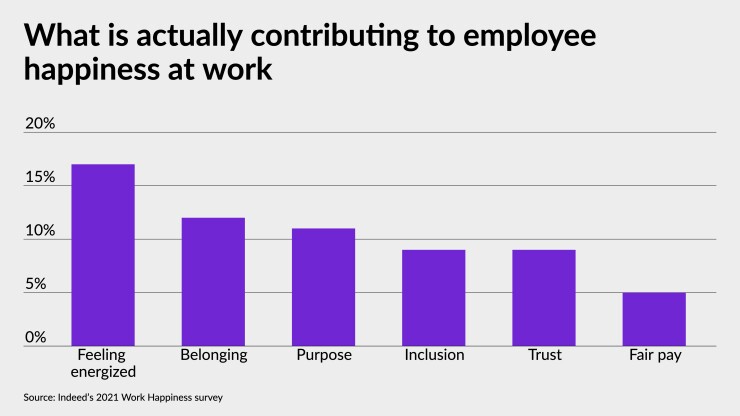Employees aren’t just quitting their jobs because they’re unhappy at work. They’re quitting because they know that they could be happy elsewhere.
In June 2021, four million workers resigned from their jobs according to the Bureau of Labor Statistics. But research shows that the massive
Which is why, when faced with these findings, Indeed found it as a good opportunity to reframe the conversation from a “great resignation” to a great realization, according to Misty Gaither, the director of diversity, inclusion and belonging at Indeed.
“The pandemic has really given us an opportunity to reflect and really reevaluate,” she says. “People are telling themselves they deserve a happier life — there has to be more meaningful work out there and that they don't have to be unhappy at work every single day.”
Read More:
The shift has also redefined what is sparking joy for employees at work, too. In the past, happiness and fulfillment at work was directly tied to compensation, but money didn’t even rank in the survey’s top five factors listed by Indeed. Instead, feeling energized (17%), feeling like they belong (12%) and feeling purposeful (11%) are what employees are citing as the critical factors that help keep them happy.
This is not to say that equitable pay is no longer important to employees — the opposite is true. Fair compensation is now considered a fundamental need, and only once that is met can employees focus on the aspects of their jobs that drive more happiness.
Read More:
“We've seen both — we've seen people who are leaving for more meaningful work and people who are just leaving to take a break because they are burned out,” Gaither says. But a part of this great resignation is that folks [will feel] re-energized and they realize what's important to them and are going to be prioritized as people start to look for work again.”
And if they don’t find it, it will continue to contribute to the crippling labor shortage — specifically for marginalized employee demographics such as
“Companies are going to have to be in a better position to answer very specific questions during an interview process,” Gaither says. “In addition to evaluating the technical competencies of a job seeker, the company will also need to be able to connect their responses to how they actually support what inclusion looks like at their company.”






